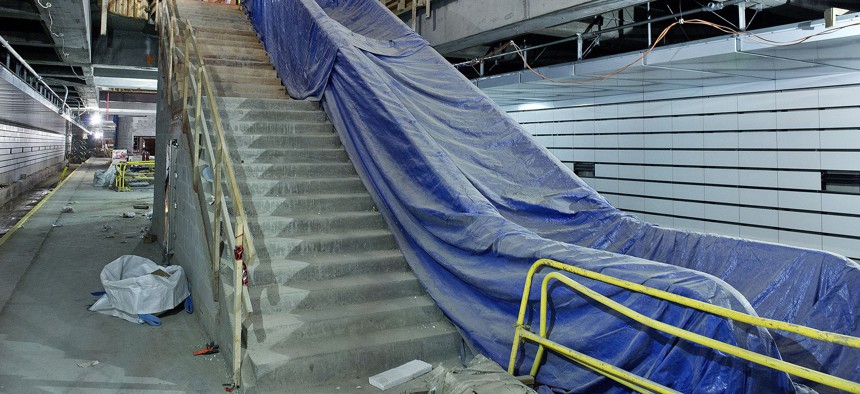When Will N.Y.C.’s New 2nd Ave. Subway Open?; 109-Page Report on County’s Mystery Urine Puddle

Someday, trains will service the 72nd Street Station on the Second Avenue Subway. Metropolitan Transportation Authority

Connecting state and local government leaders
Also in our State and Local Daily Digest: California’s last nuclear plant to close; R.I. governor vetoes revenge porn bill; and mapping Iowa City’s beer caves.
NEW YORK CITY, NEW YORK
PROJECT MANAGEMENT | The Metropolitan Transportation Authority, the massive state agency that oversees the New York City subway and is managing a variety of megaprojects, has remained steadfast that the first phase of the long-awaited Second Avenue Subway line will open in December 2016. But as construction and other delays have stacked up, an independent engineering consultant told the MTA’s board that it will take “a very aggressive and unprecedented performance” to meet that opening target. One problem: Within the MTA, Capital Construction, which is building the subway extension, and New York City Transit, which will launch and operate service on the 2nd Avenue Subway line, are known to be very territorial and don’t like to play well together. [Second Avenue Sagas]
PIERCE COUNTY, WASHINGTON
WORKPLACE | A mystery surrounding a puddle of urine that appeared on a Pierce County employee’s desk chair remains unsolved, despite an investigation that culminated in a 109-page report. Lab tests confirmed the 3-by-10 inch wet spot was pee. The worker with the wetted workstation singled out one particular suspect: a woman whose work he had criticized. Days before the urine incident, he had identified 250 errors in her work. Tension had brewed between them previously as well. Despite looking at evidence like key card records, human resources investigators could not prove the woman was the culprit. But she could be disciplined for other problematic behavior, including falsifying records and lying on her timecard. [The News Tribune]
PORTLAND, MAINE
PUBLIC HEALTH | Maine’s largest city became the first municipality in the Pine Tree State to increase the minimum age to buy cigarettes. When the law takes effect in 30 days, smokers will have to be age 21 or older to purchase cigarettes inside city limits. “I’m not under any illusion that this will prevent everyone from buying tobacco,” Councilor Edward Suslovic said, “but let’s convince our surrounding towns to follow. Let’s show Augusta what real leadership is.” [Portland Press-Herald]
SAN LUIS OBISPO COUNTY, CALIFORNIA
NUCLEAR POWER | Pacific Gas and Electric Co. announced plans Tuesday to close the last nuclear power plant operating in California. The utility said it would not pursue a license renewal for a pair of reactors at Diablo Canyon, and that the facility would shut down in 2025. The power plant is located near Avila Beach, about 200 miles up the Pacific Coast from Los Angeles. Both reactors came online in the mid-1980s. Closing the plant stands to have an economic impact on San Luis Obispo County. The facility is the largest private industry employer there, with nearly 1,500 workers who earned salaries that averaged around $136,000 in 2011. [The Tribune]
PROVIDENCE, RHODE ISLAND
REVENGE PORN | Rhode Island Gov. Gina Raimondo, fearing that proposed legislation to outlaw the posting of “revenge porn” was overly broad and could have “a chilling effect on free speech,” used her veto pen for the first time on Monday night. “The right course of action is to follow the example of other states, and craft a more carefully worded law that specifically addresses the problem of revenge porn, without implicating other types of constitutionally protected speech," according to the governor. [The Providence Journal]
IOWA CITY, IOWA
MAPPING | Researchers in Iowa City have been using LIDAR mapping—Light Detection and Ranging—to map old “beer caves” in the city. The caves were once used by local breweries for storage and while the breweries may be gone, the caves remain. While it’s not entirely clear how the information from the scans will be used, it could better inform possible future uses of the underground chambers, including, potentially public tours. “They’re underground and, as noted, there are serious considerations about access and safety,” according to Mark L. Anderson, a research specialist with the Iowa Society of the Archaeological Institute of America. “It would be quite an endeavor, not impossible, but it would take quite a bit to be able to do some kind of publicly accessible version.” [The Gazette]

NEXT STORY: Agencies push for open standards across cloud services




